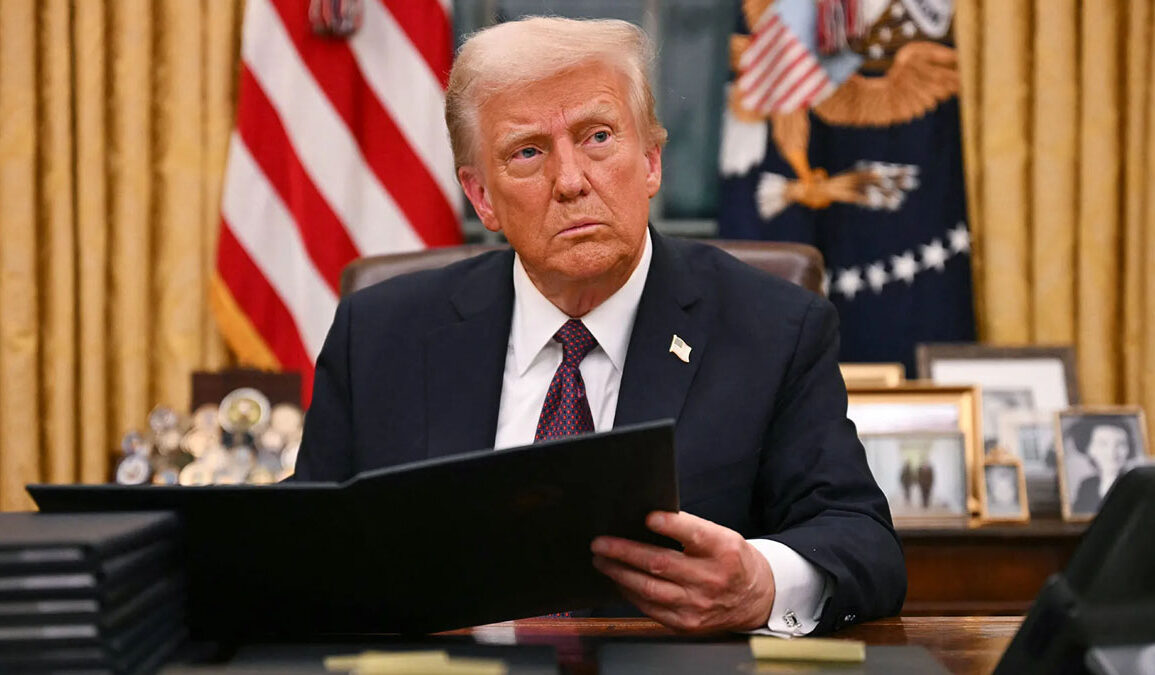President Donald Trump’s executive order to end birthright citizenship for the children of non-citizens has been blocked once again – this time by a federal judge in New Hampshire who found a new legal path around a recent Supreme Court ruling. U.S. District Judge Joseph Laplante, an appointee of President George W. Bush, issued a nationwide block through a class action lawsuit, despite the Supreme Court’s recent decision limiting the power of district courts to halt presidential actions for the whole country.
Laplante’s move comes just weeks after the Supreme Court ruled 6–3 that lower courts could no longer issue sweeping nationwide injunctions against federal policies. But the high court left the door open for class action lawsuits, which is the path Laplante took. He certified a class consisting of infants who would be denied citizenship under Trump’s order and declared that enforcing the policy would cause “irreparable harm.”
In his ruling, Laplante said, “The deprivation of U.S. citizenship and an abrupt change of policy that was longstanding… that’s irreparable harm. U.S. citizenship is the greatest privilege that exists in the world.”
What Trump’s Order Tried to Do
Trump’s executive order, signed on January 20, the first day of his second term, sought to restrict birthright citizenship to children with at least one parent who is either a U.S. citizen or a lawful permanent resident. The order stated that government agencies should not issue citizenship documents to children born to illegal immigrants or temporary visa holders.
Supporters of the order argue that the 14th Amendment was never intended to grant automatic citizenship to the children of those who enter the country illegally or temporarily. They point out that the original purpose of the amendment was to ensure the rights of formerly enslaved people after the Civil War—not to reward illegal immigration.
Attorney General Pam Bondi, speaking alongside Trump, said, “The President is protecting the integrity and value of American citizenship. This order closes a loophole that has been exploited for decades.”
Early Court Battles and Supreme Court Limits
Trump’s policy was immediately challenged by more than 22 states and multiple immigrant rights groups. Lower courts quickly moved to block the order, calling it unconstitutional. But the Trump administration pushed back, appealing those decisions until the matter landed before the Supreme Court.
On June 27, the high court ruled that federal district judges could no longer issue nationwide injunctions, saying such orders exceeded their proper role. However, the justices specifically left open the possibility of broad legal action through class action lawsuits.
Writing for the majority, Justice Amy Coney Barrett said, “Class-action litigation may serve as a lawful and effective vehicle for plaintiffs to seek relief that extends beyond their own circumstances.” Justice Brett Kavanaugh added that “deciding these cases is a critical part of our job,” even if it means reviewing emergency stays against major federal actions.
But some justices warned that allowing courts to use class actions to sidestep the new limits could become a serious problem. Justice Samuel Alito, joined by Justice Clarence Thomas, cautioned, “Lax enforcement of the requirements for class certification would create a potentially significant loophole to today’s decision.”
How the ACLU and Judge Laplante Circled Back
The American Civil Liberties Union wasted no time. Just hours after the Supreme Court’s decision, they filed a class action lawsuit in New Hampshire. The case was brought on behalf of children born to non-citizens, including a pregnant asylum-seeker in New Hampshire, a father whose wife gave birth in March, and a woman who gave birth in April.
Judge Laplante agreed to certify the class—but only for the infants, not their parents. He explained that including parents, who each have different immigration statuses, could complicate the class certification process and delay the case. “There’s no time for discovery,” Laplante said during the hearing. “I’m the judge who wasn’t comfortable with issuing a nationwide injunction. Class action is different.”
In his 38-page written ruling, Laplante repeated his concern that the policy had been rushed into effect without legislation or public debate. He wrote, “I have no difficulty concluding that the rapid adoption by executive order, without legislation and the attending national debate… constitutes irreparable harm.”
White House Responds: Courts Overstepping
The White House blasted the decision as an attempt to defy the authority of the president and the Supreme Court. Spokesman Harrison Fields said, “This is an obvious and unlawful attempt to circumvent the Supreme Court’s clear order against universal relief. This judge’s decision disregards the rule of law by abusing class action certification procedures.”
Fields added that the administration would “fight vigorously against the attempts of these rogue district court judges to impede the policies President Trump was elected to implement.”
Many of Trump’s supporters view this legal maneuver as part of a growing pattern of courts interfering with a sitting president’s constitutional duty to enforce immigration laws and protect national sovereignty. They argue that the judiciary is now being used as a political weapon to block policies that have wide public support, especially among voters concerned about illegal immigration.
One commentator on conservative media remarked, “If the president can’t even define who is a citizen without getting tied up in court, then who is really running the country—the White House or a handful of unelected judges?”
Advocates Cheer, Critics Warn of “Catastrophic” Impact
Opponents of Trump’s policy, however, say the executive order would strip away rights that have been protected under the Constitution for more than 100 years. The ACLU and other groups argue that ending birthright citizenship would effectively create a class of stateless children who could face stigma, loss of voting rights, and even deportation.
ACLU lawyer Cody Wofsy called the ruling “a huge victory,” saying it “will help protect the citizenship of all children born in the United States, as the Constitution intended.” Carol Rose of the ACLU of Massachusetts added, “Yet another court ruling affirms that the U.S. Constitution gives citizenship equally to all babies born in the United States—not only to those who can prove their parents’ citizenship or permanent status.”
The Trump administration has said it will appeal the decision and move forward with guidance on how the order will be implemented. The Justice Department previously stated it would begin enforcement as early as July 27, following a 30-day pause imposed by the Supreme Court.
But with Laplante’s new ruling now in place, and other courts still weighing similar cases, the policy’s fate remains uncertain. More appeals are expected, and legal experts believe the issue could return to the Supreme Court before the summer ends.
For now, the fight over who defines American citizenship is no longer just a legal debate. It has become a constitutional battle between the executive branch and the judiciary—one that could shape immigration policy and presidential power for years to come.








